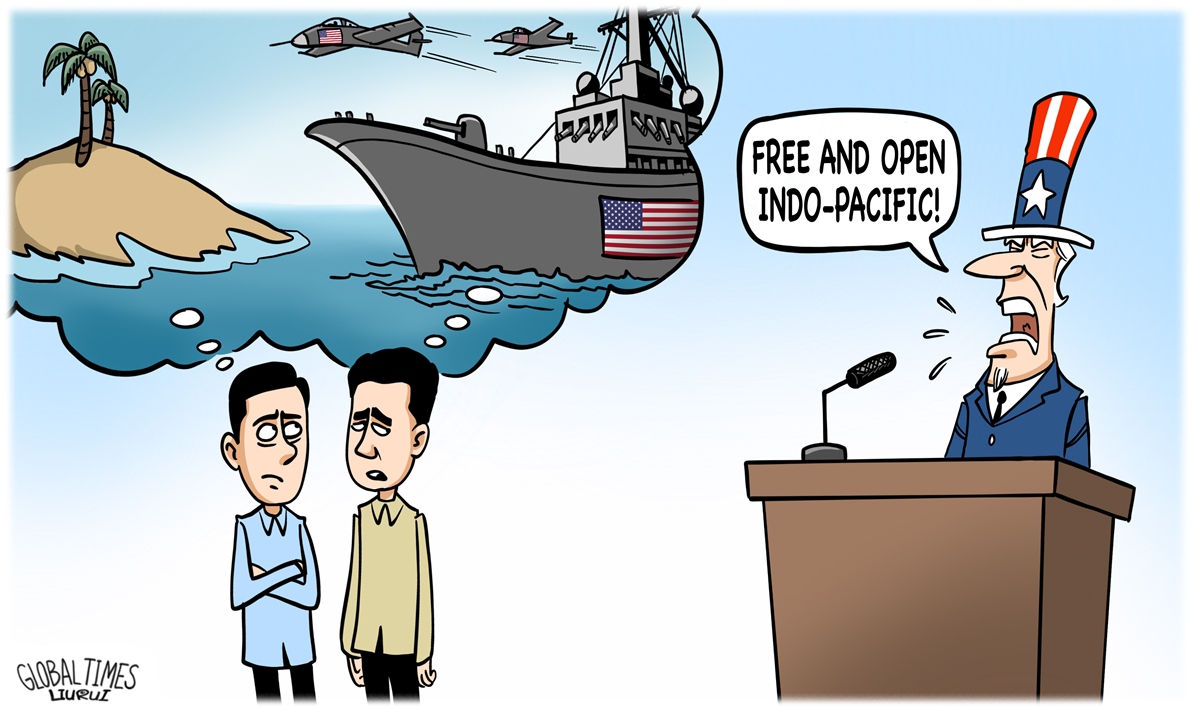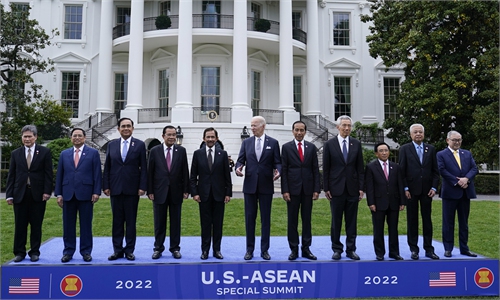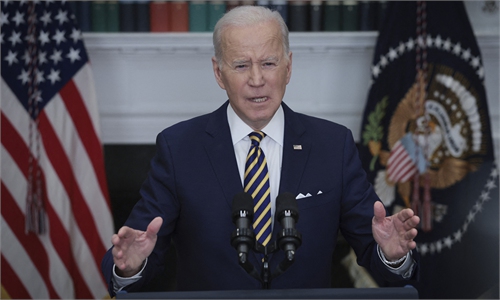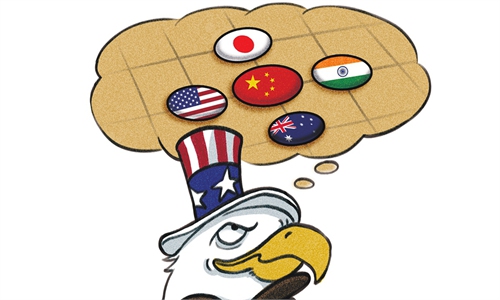Biden to peddle new economic framework in Asia as ‘geopolitical tool’ to counter China

Indo-Pacific Illustration: Liu Rui/GT
US President Joe Biden will kick off his Asian trip to South Korea and Japan from Friday with the ambitious purpose to further rally Asian allies to contain China and to start a US-led Indo-Pacific economic initiative.
Observers noted that instead of being an accelerator for the regional economy, the Indo-Pacific Economic Framework (IPEF) is more like a stunt of the US to facilitate its Indo-Pacific Strategy and will bring nothing but division and disturbance to the region.
For his first visit to Asia after taking office 16 months ago, Biden is scheduled to meet with leaders of South Korea and Japan and attend the QUAD summit on May 24. During the visit, which was described by many media as a "crucial effort to bolster regional cooperation and counter China," Biden will also announce the launch of the Indo-Pacific Economic Framework on May 24.
After touting the IPEF to ASEAN in last week's summit, the US may embrace active feedback from Japan and South Korea. Kyodo News reported on Wednesday that Prime Minister Fumio Kishida plans to announce Tokyo will join the IPEF "in a bid to counter a more assertive China." On the same day, Yonhap News said that Seoul is willing to participate in the IPEF and play a leading role. President Yoon Suk-yeol will attend the IPEF inauguration summit meeting via video.
Reuters quoted analysts as saying that only two of the 10 ASEAN countries - Singapore and the Philippines - are expected to be among the initial group to sign up for negotiations under IPEF.
To cooperate with the US government's recent play of the "Taiwan card," a bipartisan group of 52 US senators signed a letter to Biden on Wednesday campaigning for the island of Taiwan's inclusion in IPEF.
Geo-strategic framework
Being embedded in a deep political and strategic purpose, the IPEF is a geo-strategic framework rather than an economic framework, analysts said, noting it is also one of the US' measures to draw regional and ASEAN countries and to counter China's Belt and Road Initiative and the influence of the Regional Comprehensive Economic Partnership (RCEP) trade deal.
The IPEF was proposed by Biden at the East Asia summit in October 2021 to strengthen US ties in the Asian region but substantive discussions on it had never begun. Before the summit with ASEAN last week, the US release said that under the framework, participants will "create common rules on trade and investment."
The US has pushed the IPEF so vexedly with the purpose to fix the shortcomings of its Indo-Pacific Strategy. Either the Quad or AUKUS mechanism is on security and military and they do not meet the needs of countries in the Asia-Pacific, leaving the US no acting point to implement the strategy in Asia, Xu Liping, director of the Center for Southeast Asian Studies at the Chinese Academy of Social Sciences in Beijing, told the Global Times.
Xu believed the US-led IPEF was more like a stunt for the US to promote its Indo-Pacific Strategy and to undermine the existing regional cooperation with China. But the US' goal to isolate China from regional countries with the IPEF is far more ideal.
The IPEF is still about security and geopolitics, and despite the US' flatulent remarks, the potential and the sustainability of the IPEF remain a question, Xu said. "Without market access or preferential tax or other contents under a real economic framework, how could it attract other countries to join?" Xu asked.
Although IPEF contains market rules which fit the ASEAN Outlook on the Indo-Pacific proposed by ASEAN, the IPEF serves US interests at the expense of regional countries, experts said.
For example, it sets higher thresholds on digital economy, environmental protection and other fields and forces these countries to be in line with US economic policies. The exclusiveness and punishment content may also collide with RCEP or the Comprehensive and Progressive Agreement for Trans-Pacific Partnership (CPTPP) and undermine the participants' interests, analysts said.
The US may meet a lot of obstacles in implementing the IPEF. Southeast Asian countries will not offend either China or the US for the sake of the other. Moreover, the Russia-Ukraine conflict has also taught many ASEAN countries that they cannot become the victim of political wrestling between major powers, Gu Xiaosong, dean of the ASEAN Research Institute of Hainan Tropical Ocean University, told the Global Times.
Although the US aims to use the IPEF to lure ASEAN and regional countries to decouple from China, Gu noted that ASEAN's relations with China and the US have their own orientation, but they are also integrated in a larger context of global labor division. Many ASEAN economies, like Vietnam, import raw materials from China, process them and export them to the US or Europe. This kind of supply chain division has lasted a long time and has brought benefits to all parties.
"This pattern of supply chain division will not change in the short term despite US efforts to hollow out China's industries. Southeast Asian industries are still dependent on China," he said.
China and ASEAN have enjoyed close economic and political relations in recent years. China's trade with ASEAN totaled 1.35 trillion yuan ($212 billion) in the first quarter of 2022, an increase of 8.4 percent year-on-year with the RCEP further boosting cooperation.
According to a recent report of the Asian Development Bank, the RCEP has played an important role in increasing the income of member economies by 0.6 percent while adding $245 billion and 2.8 million jobs to the regional economy by 2030.
The situation with Japan and South Korea is a little similar to ASEAN, Gu said, as he forecast that the two countries will enhance interaction with the US in terms of politics and security, but will still strengthen economic relations with China and ASEAN under the RCEP to maximize their own interests.
Although Japan welcomes the IPEF, Kyodo News reported that Japan will not change its stance of seeking Washington's return to the CPTPP, an 11-country trade pact abandoned by the Trump administration.
Cui Hongjian, director of the Department of European Studies at the China Institute of International Studies, said that South Korea, Japan, and the US still have some divergences in industries, especially between the US and Japan, some industries are overlapping, thus creating competition.
"For areas where Japan has problems to solve with the US or has competition with the US, the US government will 'let the market decide' - that is, to ignore Japan's request. But in areas where the US could crack down on China, like chips, the US might seek cooperation with Japan to push China out of the Indo-Pacific economic system," he told the Global Times.
As for the proposal to include Taiwan in the IPEF, US lawmakers are using this to create momentum for Biden to play the "Taiwan card" more during his Asia trip. Such a proposal aims to sound out the mainland's response. If it is strongly deplored, the US will stay back. Otherwise, it will step forward until it erases the one-China principle. And this is why Chinese senior diplomats made solemn warnings, said Yuan Zheng, a deputy director and senior fellow of the Institute of American Studies, the Chinese Academy of Social Sciences.
The IPEF is a geo-strategic framework. The island of Taiwan, South Korea or Japan or any other participant is a chess piece for the US to play to contain China and can be abandoned at any time, analysts said, warning secessionists in the island of Taiwan they will be burned if they still choose to follow the US.
In the face of US tactics, Gu said that China should take action to consolidate its own economy, including the internal and external economic circulation. It should also take the opportunity of the RCEP to strengthen relations with ASEAN, Japan and South Korea like increasing BRI investment in relevant countries. It would be much harder for the US to achieve the IPEF or the Indo-Pacific Strategy.
Xu also noted that China should focus on its own strategy since it has advantages over the US. For example, geographically, it is located near ASEAN and has solid cooperation with regional countries. Moreover, the vast Chinese market and rising economy are also more attractive.





